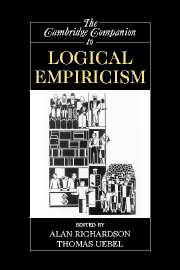Book contents
- Frontmatter
- Introduction
- Part I The Historical Context of Logical Empiricism
- Part II Logical Empiricism: Issues in General Philosophy of Science
- Part III Logical Empiricism and the Philosophy of the Special Sciences
- 7 The Turning Point and the Revolution: Philosophy of Mathematics in Logical Empiricism from Tractatus to Logical Syntax
- 8 Logical Empiricism and the Philosophy of Physics
- 9 Logical Empiricism and the Philosophy of Psychology
- 10 Philosophy of Social Science in Early Logical Empiricism: The Case of Radical Physicalism
- 11 Logical Empiricism and the History and Sociology of Science
- Part IV Logical Empiricism and its Critics
- Bibliography
- Index
- Series List
7 - The Turning Point and the Revolution: Philosophy of Mathematics in Logical Empiricism from Tractatus to Logical Syntax
from Part III - Logical Empiricism and the Philosophy of the Special Sciences
Published online by Cambridge University Press: 28 January 2008
- Frontmatter
- Introduction
- Part I The Historical Context of Logical Empiricism
- Part II Logical Empiricism: Issues in General Philosophy of Science
- Part III Logical Empiricism and the Philosophy of the Special Sciences
- 7 The Turning Point and the Revolution: Philosophy of Mathematics in Logical Empiricism from Tractatus to Logical Syntax
- 8 Logical Empiricism and the Philosophy of Physics
- 9 Logical Empiricism and the Philosophy of Psychology
- 10 Philosophy of Social Science in Early Logical Empiricism: The Case of Radical Physicalism
- 11 Logical Empiricism and the History and Sociology of Science
- Part IV Logical Empiricism and its Critics
- Bibliography
- Index
- Series List
Summary
I am convinced that we now find ourselves at an altogether decisive turning point in philosophy. And that we are objectively justified in considering that an end has come to the fruitless conflict of systems.
Bertrand Russell and Gottlob Frege have opened up important stretches in the last decades, but Ludwig Wittgenstein (in his Tractatus-Logico-Philosophicus, 1922) is the first to have pushed forward to the decisive turning point.
Moritz Schlick, 1930Its philosophy of logic and mathematics was what most characteristically distinguished logical empiricism from previous forms of empiricism or positivism. This is the aspect that gave it the name logical empiricism, and gave it the hope of succeeding where the nineteenth-century attempts at a scientific empiricism by such figures as Comte, Mill, and Mach had failed. The inability of these thinkers to supply a plausible account of mathematics had undermined the claim of empiricism to be the philosophical approach most adequate to modern science. It was generally agreed that Mill's empiricist account of arithmetic had not succeeded.
Information
- Type
- Chapter
- Information
- The Cambridge Companion to Logical Empiricism , pp. 165 - 192Publisher: Cambridge University PressPrint publication year: 2007
Accessibility standard: Unknown
Why this information is here
This section outlines the accessibility features of this content - including support for screen readers, full keyboard navigation and high-contrast display options. This may not be relevant for you.Accessibility Information
- 7
- Cited by
